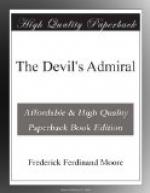“Gold!” I said. “You say there is gold aboard?”
“Yes, gold!” he almost shouted at me. “Chests of gold coin, a dozen or more! That’s what they’re after, and that’s what they’ll get, and that’s what it is all about—Trego and all the rest of it!”
“And you never knew?” I asked, more to take his mind off his troubles and rouse his fighting spirit than for the information, for the details mattered little to us now.
“Mr. Trenholm,” he began with fervor, “if I had known there were any dangers I could have met them. I’ve faced death enough in my day not to fear it, and I’m no weakling if I am an old man. But a master should know what’s in his ship and what’s before him, and not be caught in a mess of lies and sneaking. But perhaps the owners didn’t know—the ship’s in charter for the voyage, and Mr. Trego took charge at the last minute.
“Looking back now, I’m minded to think they were afraid I’d turn pirate at the sight of a few chests of gold. They thought they were slick; but there were others just as slick, laying lines to beat ’em; and here I am, without officers or crew or ship, and jailed in my own fo’c’sle. Doggone it! I guess all hands knew about that gold but me!
“What do they do? Kill my bos’n ashore, take the lampman for it, and make me so short-handed that I ship a gang of pirates as passengers. It was understood that there were to be no passengers this trip; but the owners saw a chance to make a few dollars extra, and the charter party says all right. I heard that much, and then the banker, who acted for the charter party, says to another: ’It will make it look more ordinary to carry passengers if there is some care exercised.’
“Some care! They give me a parson that’s a pirate, and he makes me suspect you of a murder; and you bring one of his very men aboard—and me, like a fool, ship him—and the other two he brings with his organ.”
“But the gold—why should they ship so much gold in this manner?”
“For the Russians,” he said. “I went through Trego’s papers, and the best I can make out of a lot of foreign writing is that it is going to Hong-Kong to buy coal for the Baltic fleet. At first they were going to make their headquarters in Manila and do the business there; but the most of the tramps—colliers—are British, and they found it easier to do business out of Hong-Kong, I suppose, because the Japanese could keep close watch of suspicious vessels making Manila a port of call.
“Ye see, all the banks out here are full of spies—–Chinese clerks and all hands—and they are watching day and night. The masters of the colliers and the blockade-runners into Port Arthur won’t take checks or other money—they want it slap down in solid gold before they will sail, and this gold had to be landed in Hong-Kong.
“The Japs might send a couple of cruisers for it if they shipped it openly, so they try to sneak it through like this, and with all their hiding and lying and sneaking there was a leak somewhere, and these fine chaps aboard us laid lines to git it—and here we are.”




